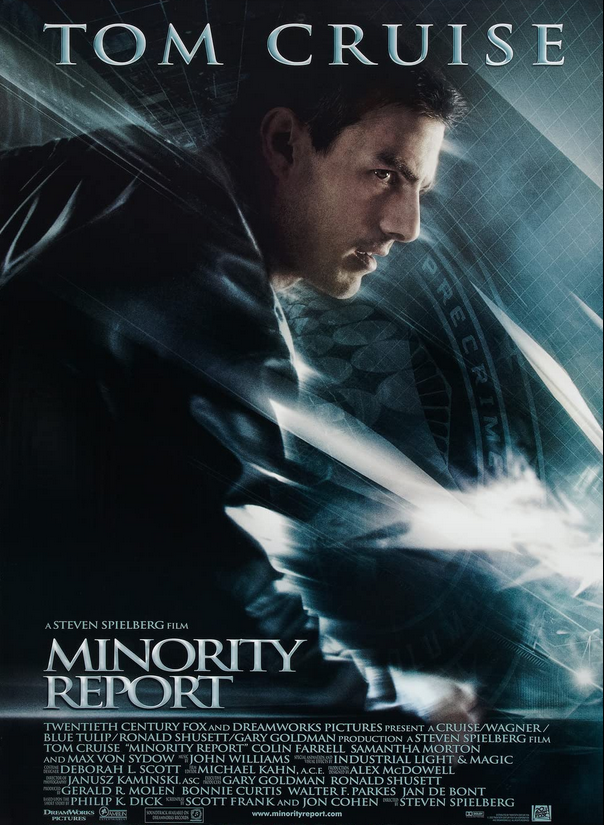
Bringing Philip K. Dick's work to the cinema is no easy task. Like Richard Matheson, they are among the best science fiction writers that world literature has ever produced.
But writing a book that allows our fantasy to imagine so many apparently improbable situations is one thing. And translating them to film is another.
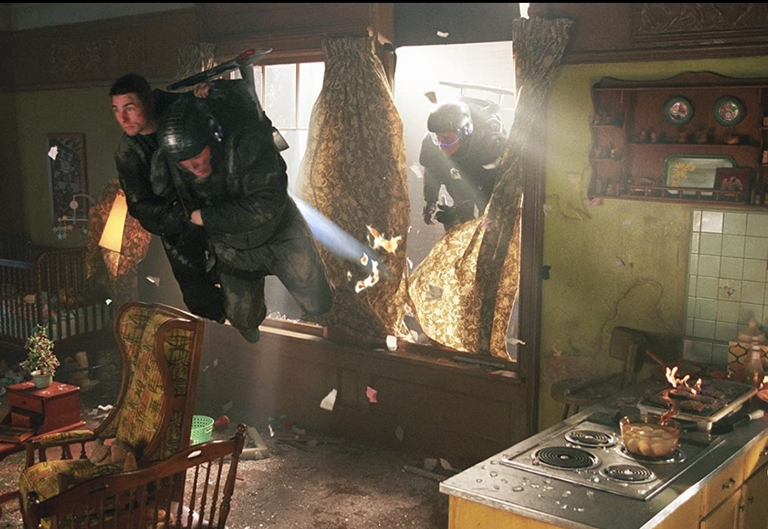
In this case the direction was entrusted to a true expert in this type of subject, Steven Sipelberg, to give a little more verisimilitude and confidence to the story, and the result is a good product, with the limitations that Tom Cruise can offer as an actor, but without a doubt a blockbuster image for the big screen.
In this case Cruise could not count on an acting phenomenon at his side like Dustin Hoffman in The Rain Main, but the sobriety of Max von Sydow and a young and discreet Colin Farrel (that of Alexander the Great) allow him to come out of this test with flying colours.
Minority Report is a fierce critique of the control of society in the not too distant future. Something that we are already beginning to see at least in some places and that some legislations -especially European- are trying to control with the limitations and protection of personal privacy (the famous privacy law).

The plot is set in the year 2054, which may not seem very far away nowadays, but it was when Philip K. Dick wrote the novel in 1956, i.e. almost a century ahead.
For this reason, something that today seems close to a future reality at that time, a century ago, was pure fantasy.
The year is 2054 and the Washington D.C. Police Department in the USA has created a special unit called "PreCrime" which aims to prevent crimes in the American city that had reached an alarming level.
Through three "seers" represented by twin brothers and a mentally disturbed woman who have been recovered - after numerous failed attempts with their consequent deaths as it becomes clear towards the end of the film - the criminal action is anticipated enough to allow law enforcement led by Captain John Anderton (Tom Cruise) to intervene and prevent the murder. Such is the popularity of the project that a future plebiscite is planned to give it full autonomy.
The two brothers and the woman have precognitive powers that allow them to predict future crimes. The speed of reaction of the police with modern means of transport and agents propelled by reaction systems allows them to intervene successfully in the space of a few minutes.
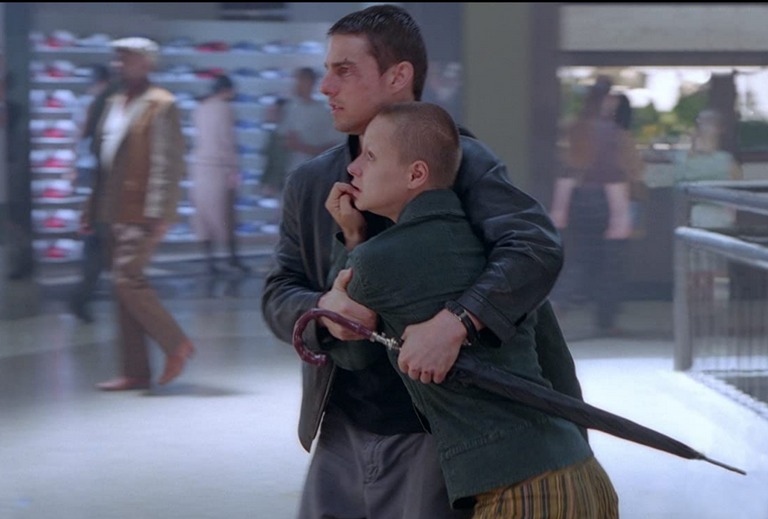
The programme is a success and no one cares too much about being constantly watched through electronic eyes installed in most shops, streets and places of pedestrian and vehicular traffic that read the retina of the human eye to identify the person. There is a huge data bank to store all this information.
When the subject involved is arrested - about to commit his murder - he is arrested and placed in a state similar to hibernation in special tubes that represent future prisons.
In parallel, the plot deals with Anderton's private life with a drama behind him: after surfacing from the water in the public swimming pool where he was playing with his son, he discovers that his son has disappeared. His wife accuses him of neglect and they separate.
When the precognitive power of the three chosen ones signals a new future crime, he discovers that it is in fact he himself who will try to kill a person (later discovered to be his son's abductor) and flees, pursued by the police.
His presence is signalled by the eye bulbs that denote his presence at all checkpoints and signalling points: in the pharmacy, in the shopping centre, when he walks. The only solution is an eye transplant, and for this he uses the services of a black market surgeon.
With the new eyes his presence is undetected and he is able to reach the control centre where he can talk to the young psychic who, in a state of semi-hypnosis, reveals to him that in reality it is all a plot hatched by the director of the PreCrime project himself, Lamar Burgess (played by Max von Sydow), who is plotting at all costs to make the project fail. And for that to happen, even one crime must be committed.
When the plot is uncovered, Lamar Burgess commits suicide, John Anderton regains his freedom and the final sequences of the film show his reconciliation with his wife who is expecting a new child.

A good cinematic story (especially very much in line with the novel) that anticipates Philip K. Dick's vision of the totalitarian effect on the actions of some governments by a century.
It was probably influenced by the post-war symptoms of the Second World War and the state's control over people in the totalitarian regimes of the time (Nazism, communism, etc.).
The eyes represent the obsessive control of the state over people (today those eyes could well be the modern media and their influence on the behaviour of users). The truth is that the goal remains the same: to control people in order to prevent their future actions, not only socially but also economically and politically.
The terror of blindness, which in our everyday lives takes on a purely personal dimension, in Dick's story and Spielberg's film becomes a conditioning element for escaping authoritarian and state control.
The metaphor is perfectly fulfilled. I think that leaving aside some of the visual artifices to which Spielberg has had to resort to subtract from Dick's novel, we are in the presence of one of the best science fiction films of the decade, a true cult for many fans of this genre of cinema.

Tom Cruise: John Anderton
Colin Farrell: Danny Witwer
Samantha Morton: Agatha
Max von Sydow: Lamar Burgess
Patrick Kilpatrick: Knott
Lois Smith: Iris Hineman
Peter Stormare: Solomon Eddie
Tim Blake Nelson: Gideon
Steve Harris: Jad
Kathryn Morris: Lara Anderton
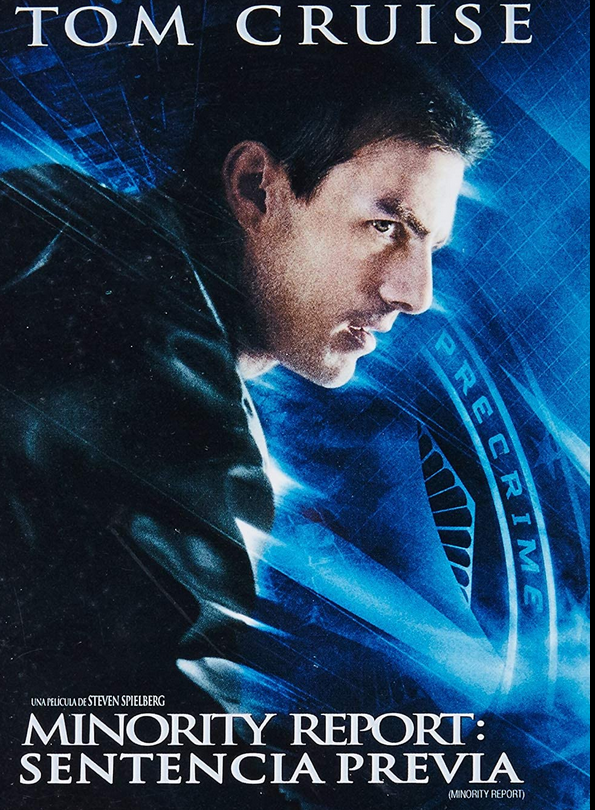
Llevar al cine una obra de Philip K. Dick no es una tarea fácil. Al igual que Richard Matheson son de los mejores escritores de ciencia ficción que haya dado la literatura universal.
Pero escribir un libro permitiendo a nuestra fantasía imaginar tantas situaciones aparentemente inversímiles es una cosa. Y trasladarlas al cine es otra.
En este caso la dirección fue confiada a un verdadero experto en este tipo de temas, Steven Sipelberg, para dar un poco más de verosimilitud y confianza al relato y el resultado es un buen producto, con las limitaciones que Tom Cruise puede ofrecer como actor, pero sin lugar a dudas una imagen taquillera para la pantalla grande.
En este caso Cruise no pudo contar con un fenómeno actoral a su lado como Dustin Hoffman en The Rain Main, pero de igual manera la sobriedad de Max von Sydow y un joven y discreto Colin Farrel (el de Alejandro Magno) le permiten salir airoso de esta prueba.
Minority Report conocida con el nombre de Sentencia Previa en Hispanoamérica es una crítica feroz al control de la sociedad en un futuro no demasiado lejano. Algo que ya estamos comenzamos a ver en mínima parte y que algunas legislaciones -especialmente europeas- están tratando de controlar con las limitaciones y protección de la privacidad personal (la famosa ley de la privacy).

La trama se sitúa en el año 2054 y si bien a nuestros días no parece una fecha muy lejana sì lo era en cambio cuando Philip K. Dick escribió la novela en el año 1956, es decir un escenario adelante de casi un siglo.
Por ese motivo, algo que parece hoy en día cercano a una realidad futura en ese momento, hace un siglo atrás, era fantasía pura.
Estamos en el año 2054 y la Policía del departamento de Washington D.C. en los EE. UU. ha creado una unidad especial llamada "PreCrime" que tiene como objetivo prevenir los crímenes en la ciudad estadounidense que habían llegado a un nivel alarmante.
A través de tres "videntes" representados por dos hermanos gemelos y una mujer con trastornos mentales que han sido recuperados -luego de numerosos tentativos fallidos con sus consecuentes muertes como se aclara hacia del final de la película- la acción criminal es anticipada lo suficiente como para permitir a las fuerzas del orden encabezadas por el capitán John Anderton (Tom Cruise) de intervenir y evitar el homicidio. Es tal la popularidad del proyecto que se planea un plebiscito futuro para dotarlo de una total autonomía.
Los dos hermanos y la mujer tienen poderes precognitivos que les permiten predecir los futuros crímenes. La velocidad de reacción de la policía con medios modernos de transporte y con agentes propulsados con sistemas a reacción les permiten intervenir exitosamente en el giro de pocos minutos.
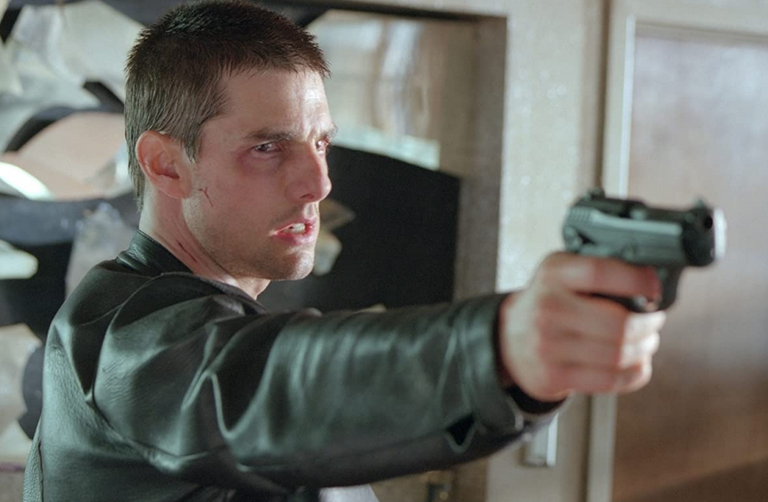
El programa es un éxito y a nadie le importa demasiado de ser constantemente vigilado a través de ojos electrónicos instalados en la mayoría de los negocios, calles y lugares de tránsito peatonal y vehicular que leen en la retina del ojo humano la identificación de la persona. Existe un banco de datos enorme para almacenar toda esta información.
Cuando el sujeto involucrado es detenido -a punto de cometer su asesinato- es arrestado y colocado en un estado similar al de la hibernación en unos tubos especiales que representarían las cárceles futuras.
En forma paralela la trama trata la vida privada de Anderton con un drama a sus espaldas: luego de salir a la superficie del agua en la piscina pública donde jugaba con su hijo descubre que éste ha desaparecido. Su mujer lo acusa de negligencia y se separan.
Cuando el poder precognitivo de los tres elegidos señala un nuevo futuro crimen descubre que en realidad es él mismo que tratará de matar a una persona (más tarde se descubre que es el raptor de su hijo) y huye perseguido por la policía.
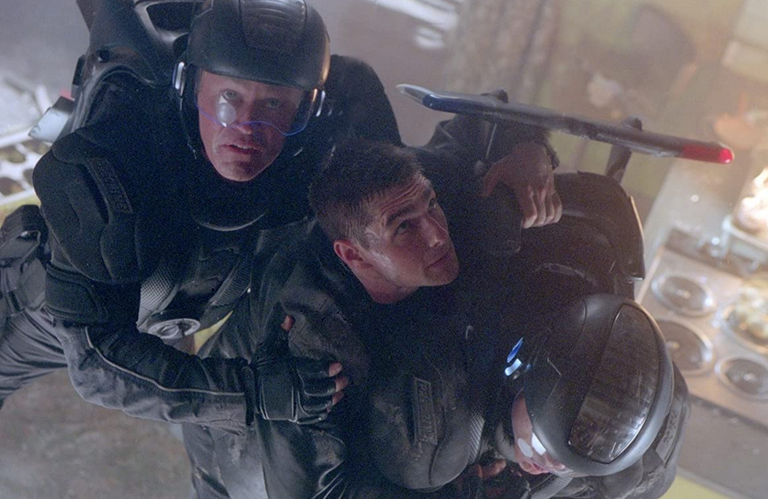
Su presencia es señalada por los bulbos oculares que denotan su presencia en todos los puntos de control y señalación: en la farmacia, en el centro comercial, cuando camina. La única solución es un transplante ocular y para ello se sirve de los servicios de un cirujano clandestino en el mercado negro.
Con los nuevos ojos su presencia no es detectada y puede llegar hasta el centro de control donde puede hablar con la joven vidente quien en un estado de semi-hipnosis le revela que en realidad todo es un complot tramado por el propio director del proyecto PreCrimen, Lamar Burgess (interpretado Max von Sydow) quien trama a todo costo que el proyecto fracase. Y para ello es necesario que se cometa aunque sea un solo crimen.
Descubierto el complot Lamar Burgess se suicida, John Anderton recupera su libertad y las secuencias finales de la película muestra su repacificación con su esposa que espera un nuevo hijo.

Un buen relato cinematográfico (sobre todo muy en línea con la novela) que anticipa de un siglo la visión que tenía Philip K. Dick sobre el efecto totalitario en el accionar de algunos gobiernos.
Probablemente haya estado influenciado por los síntomas del post-guerra de la Segunda Guerra Mundial y por el control del estado en los regímenes totalitarios imperantes en ese momento (nazismo, comunismo, etc) sobre las personas.
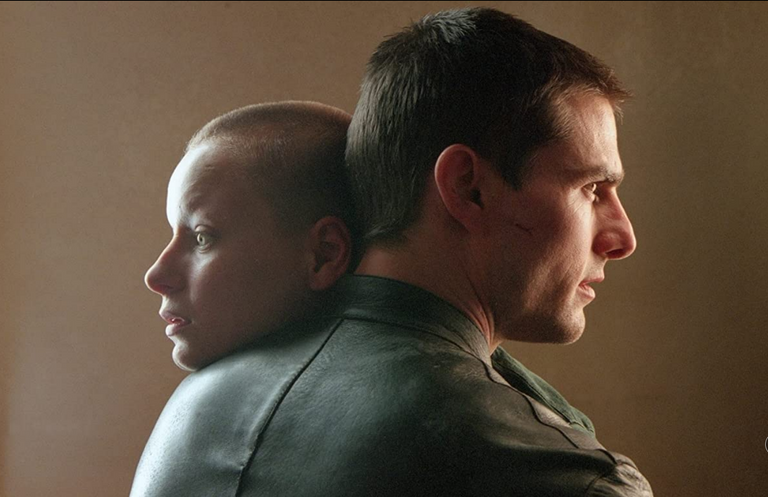
Los ojos representan el control obsesivo del Estado sobre las personas (hoy en día esos ojos podrían bien ser los modernos medios de comunicación y su influencia en la conducta de los usuarios). Lo cierto es que el objetivo continua siendo diempre el mismo: controlar las personas para prevenir su accionar futuro, no solo a nivel social sino también económico y político.
El terror de la ceguera, que en nuestras vidas cotidianas adquiere una dimensión puramente personal, en el relato de Dick y la película de Spielberg se transforma en un elemento condicionante para escapar al control autoritario y estatal.
La metáfora se cumple perfectamente. Creo que dejando de lago algunos artificios visivos a los cuáles Spielberg ha debido recurrir para restar fiel a la novela de Dick, estamos en presencia de uno de los mejores films de ciencia ficción de esa década, un verdadero cult para numerosos fanáticos de este género de cine.
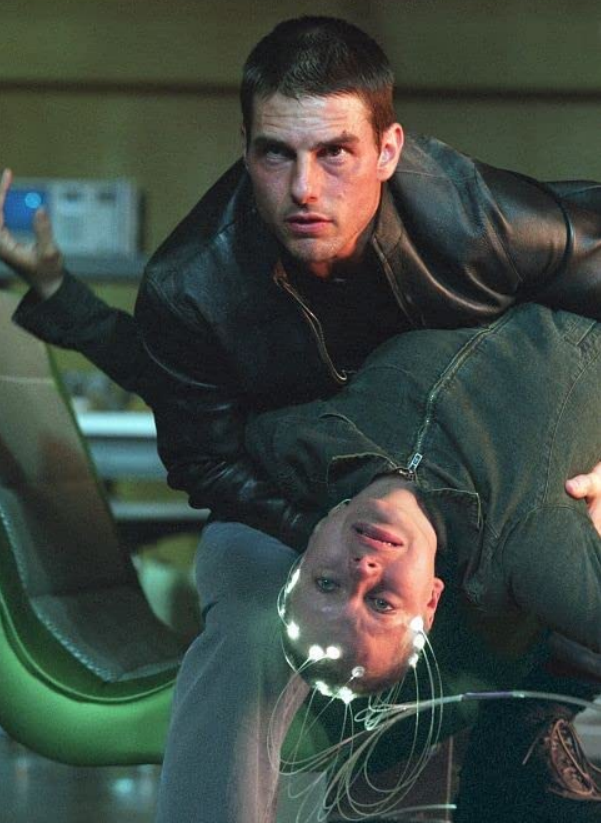

Tom Cruise: John Anderton
Colin Farrell: Danny Witwer
Samantha Morton: Agatha
Max von Sydow: Lamar Burgess
Patrick Kilpatrick: Knott
Lois Smith: Iris Hineman
Peter Stormare: Solomon Eddie
Tim Blake Nelson: Gideon
Steve Harris: Jad
Kathryn Morris: Lara Anderton
Thank you for supporting my content and voting for it @epistem.
Hi! I just curated your content!
Please take a moment to vote for my witness. 🗳️ https://blurtwallet.com/~witnesses?highlight=outofthematrix
Thank you for curating my content @outofthematrix. I see that the platform and the value of the token continue their normal course despite certain movements that you yourself had denounced. better like this